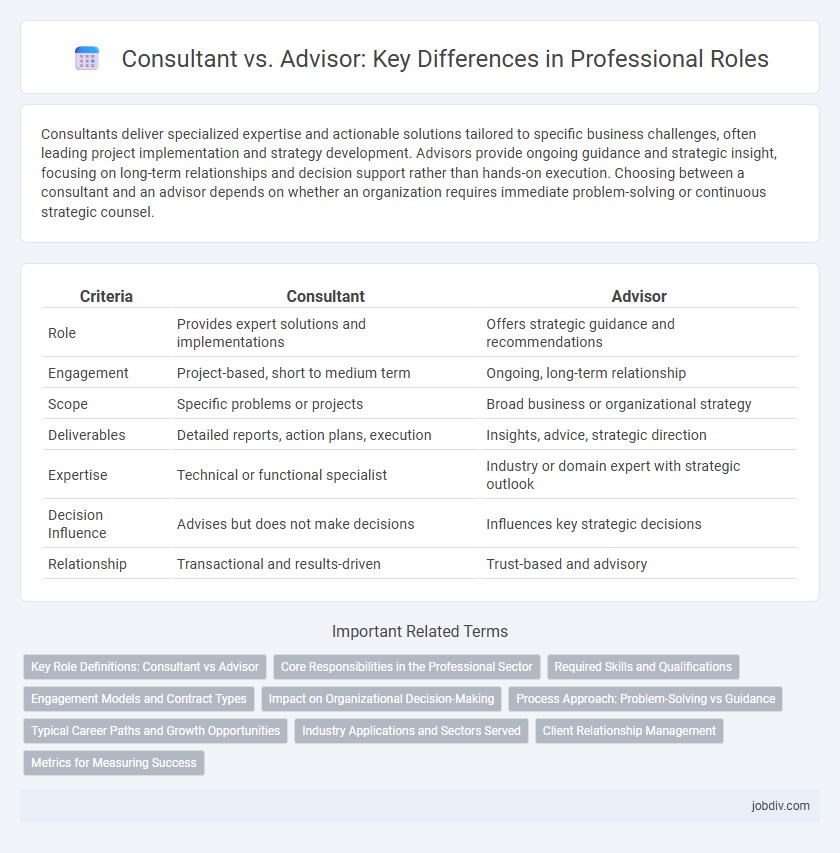Consultants deliver specialized expertise and actionable solutions tailored to specific business challenges, often leading project implementation and strategy development. Advisors provide ongoing guidance and strategic insight, focusing on long-term relationships and decision support rather than hands-on execution. Choosing between a consultant and an advisor depends on whether an organization requires immediate problem-solving or continuous strategic counsel.
Table of Comparison
| Criteria | Consultant | Advisor |
|---|---|---|
| Role | Provides expert solutions and implementations | Offers strategic guidance and recommendations |
| Engagement | Project-based, short to medium term | Ongoing, long-term relationship |
| Scope | Specific problems or projects | Broad business or organizational strategy |
| Deliverables | Detailed reports, action plans, execution | Insights, advice, strategic direction |
| Expertise | Technical or functional specialist | Industry or domain expert with strategic outlook |
| Decision Influence | Advises but does not make decisions | Influences key strategic decisions |
| Relationship | Transactional and results-driven | Trust-based and advisory |
Key Role Definitions: Consultant vs Advisor
Consultants deliver specialized expertise and actionable solutions to address specific business challenges, often working on predefined projects with measurable outcomes. Advisors provide ongoing strategic guidance and expert opinions to support decision-making processes, typically fostering long-term relationships. While consultants focus on implementation and problem-solving, advisors emphasize insight and influence at the executive level.
Core Responsibilities in the Professional Sector
Consultants analyze organizational challenges, develop strategic solutions, and implement changes to improve business performance. Advisors provide ongoing expert guidance and support to decision-makers, offering insights tailored to long-term objectives and risk management. Both roles require industry expertise, but consultants focus on project-based problem solving while advisors emphasize relationship-building and continuous counsel.
Required Skills and Qualifications
Consultants require strong analytical skills, industry-specific expertise, and project management capabilities to deliver tailored solutions and implement strategies effectively. Advisors must possess excellent communication skills, deep subject-matter knowledge, and the ability to build trust through personalized guidance and long-term relationship management. Both roles demand critical thinking, problem-solving abilities, and relevant certifications or advanced degrees in their respective fields.
Engagement Models and Contract Types
Consultants typically operate under project-based contracts with fixed deliverables and timelines, enabling structured engagement models focused on specific outcomes. Advisors usually engage through retainer agreements or hourly consultations, fostering ongoing relationships that support strategic guidance over time. Selecting the appropriate contract type depends on the organization's need for either targeted expertise or continuous advisory support.
Impact on Organizational Decision-Making
Consultants provide specialized expertise and data-driven analysis that enable organizations to implement practical solutions and achieve measurable outcomes. Advisors offer strategic guidance and long-term vision, influencing leadership perspectives and shaping high-level decision-making processes. Both play crucial roles in enhancing organizational agility and informed decision-making, with consultants often driving tactical changes and advisors focusing on policy and governance frameworks.
Process Approach: Problem-Solving vs Guidance
Consultants employ a structured process approach centered on problem-solving by analyzing challenges, developing tailored strategies, and implementing solutions to achieve measurable outcomes. Advisors focus on providing ongoing guidance and expert insights, supporting decision-making through recommendations without direct involvement in execution. Both roles complement organizational goals but differ in engagement level and methodology during project lifecycles.
Typical Career Paths and Growth Opportunities
Consultants often follow structured career paths involving progression from analyst to senior consultant and eventually partner or principal roles, emphasizing project management and client delivery skills. Advisors typically have more flexible trajectories, leveraging deep industry expertise or specialized knowledge to provide strategic guidance, often transitioning into executive positions or board memberships. Growth opportunities for consultants hinge on expanding client portfolios and service offerings, while advisors grow through reputation-building and cultivating long-term client relationships.
Industry Applications and Sectors Served
Consultants provide specialized industry insights and strategic solutions across diverse sectors such as finance, healthcare, and technology, delivering actionable plans to improve operational efficiency and drive innovation. Advisors offer ongoing expert guidance and risk assessment primarily within sectors like legal, compliance, and investment, ensuring long-term alignment with regulatory and market dynamics. Both roles serve critical functions in organizational growth by leveraging sector-specific knowledge to address unique business challenges.
Client Relationship Management
Consultants deliver specialized expertise and strategic solutions tailored to client needs, driving measurable business outcomes through structured project management. Advisors foster long-term trust by offering ongoing guidance, risk assessment, and personalized recommendations that align with the client's evolving goals. Effective client relationship management integrates proactive communication, clear expectation setting, and continuous value delivery to maximize client satisfaction and retention.
Metrics for Measuring Success
Consultants are often evaluated through specific project deliverables, return on investment (ROI), and the achievement of predefined key performance indicators (KPIs). Advisors, however, measure success by the long-term impact on decision-making quality, strategic value provided, and client satisfaction scores. Both roles emphasize metrics aligned with organizational goals but differ in the immediacy and scope of their measurable outcomes.
Consultant vs Advisor Infographic

 jobdiv.com
jobdiv.com